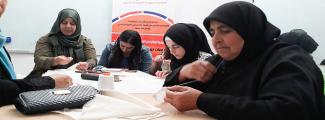With the aim to help women and develop their abilities in the sewing profession to enable them to enter the labor market and start their own business, the Syrian Society for Social Development (SSSD) team, in cooperation with the United Nations Population Fund (UNFPA), carried out a vocational training in sewing within both the Vocational Training(VT) and Gender-based Violence (GBV) Programmes at Aman Center in Talkalakh, Homs.
The training targeted women from both local and internally displaced communities, and was implemented in response to these women’s demand due to the lack of sewing workshops in the region, as well as the high prices of ready-mades.
During the training, the women learned the basics of sewing and how to tailor clothes. Also, they learnt how to use sewing machines, in addition to the methods of sketching many types of clothing and executing the latter on small pieces of cloth.
The training concluded with the distribution of cloth to all participants so that they could detail their own clothes.
All participating women interacted with the training, whereby one of them said: "Ever since I was a young girl, I just loved detailing clothes to my dolls. My dream was to study arts in order to learn the techniques of sewing, but my father couldn’t afford registering me in one of these classes… Luckily, I achieved my dream thanks to SSSD!”
Another participant said: "I had a sewing machine for a very long time, and I only used it to make clothes for my kids. Now, I can expand my work and make money out of it to support my family!”

